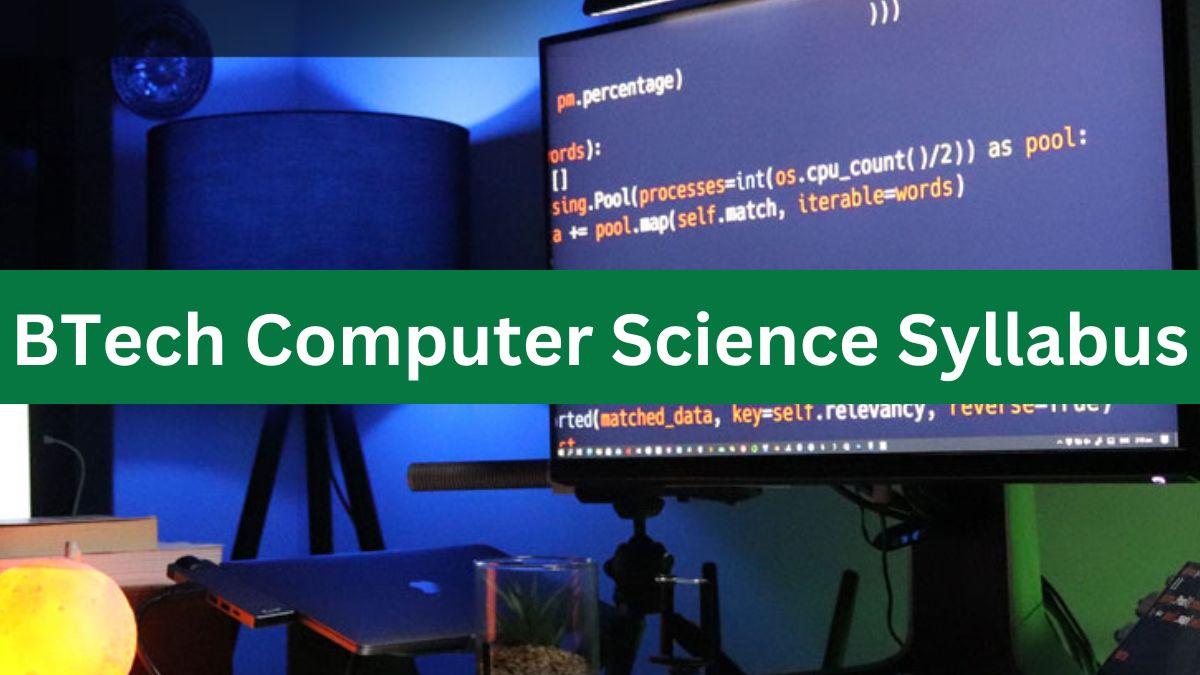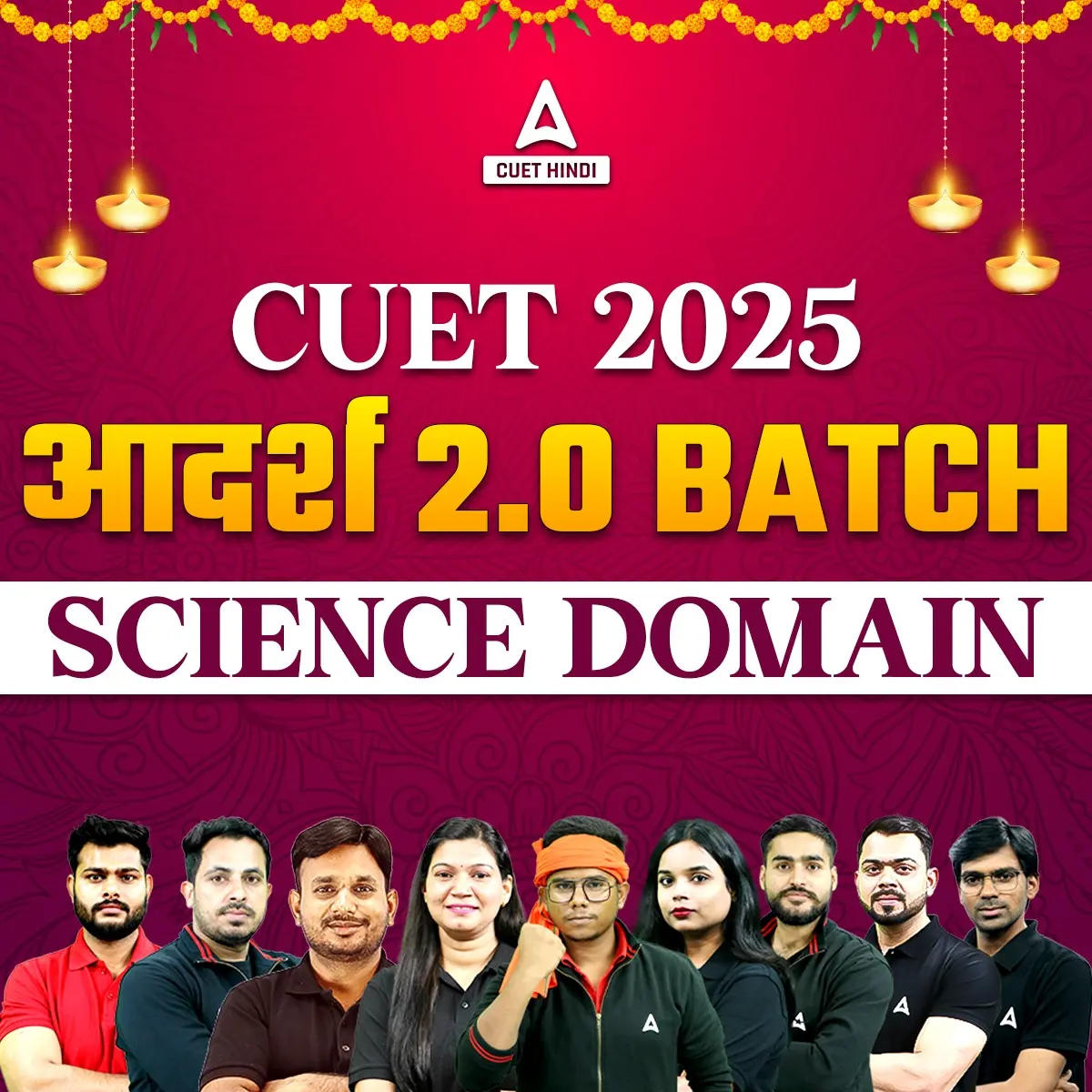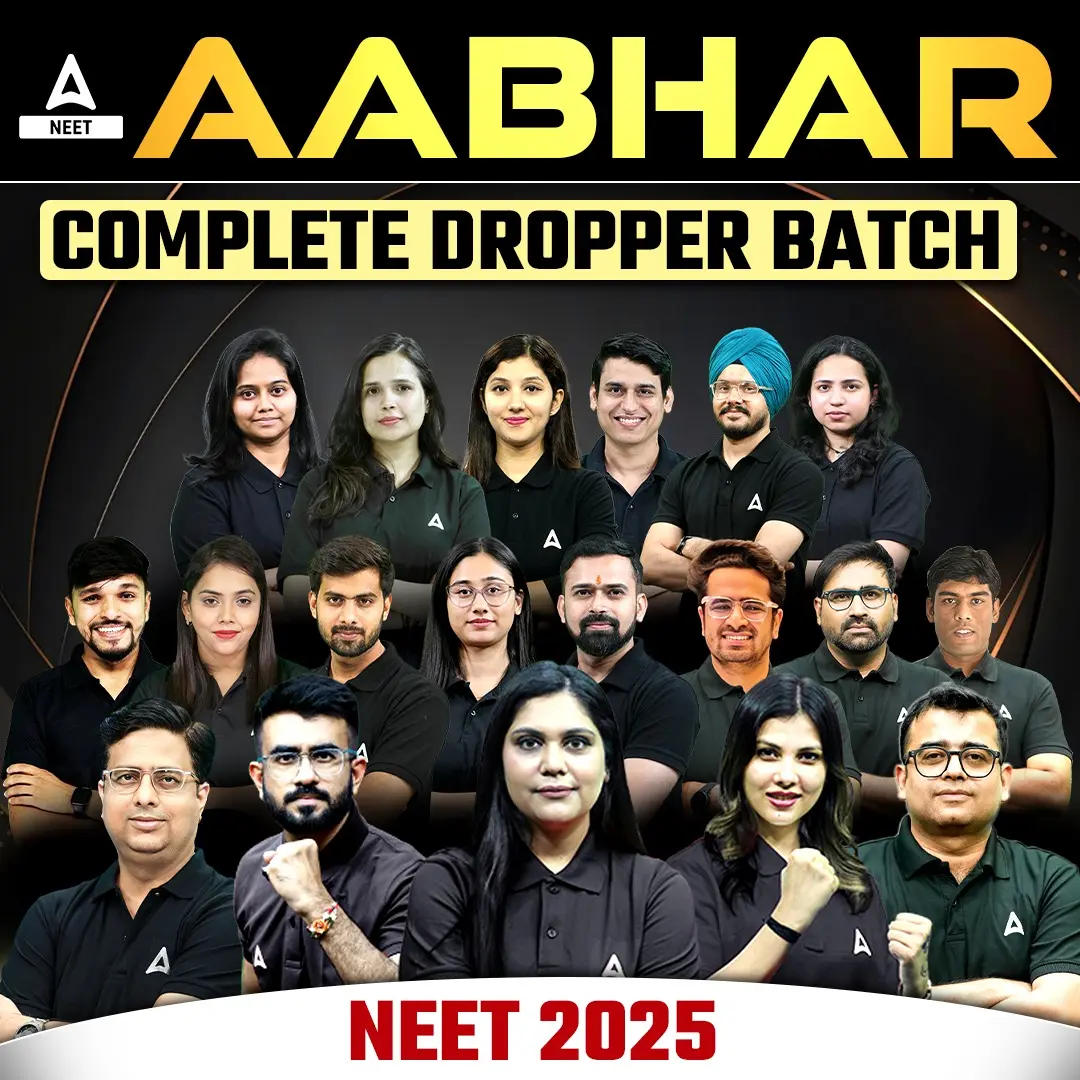Table of Contents
If you want to know about the course that will guarantee you a sure success in life, then the BTech in Computer Science (B.Tech CSE) will come out on top of the list. The Bachelor of Technology degree in Computer Science is the best engineering degree in India in context to placements. If you navigate through the placement report of any college, the B Tech CSE will give you stellar numbers. But what makes B Tech Computer Science graduates so valuable to the market. The answer lies in the BTech Computer Science Syllabus that is tailored to meet the demand of the modern tech industry.
BTech Computer Science Syllabus
The BTech CSE program’s syllabus covers a range of programming languages and subjects including C, C++, Java, Python, data structures, algorithms, operating systems, computer and optical networking, database management systems, software engineering, artificial intelligence, machine learning, web technologies, and computer graphics. Additionally, graduates can pursue advanced studies like MTech and ME in CSE. Be mindful of the variations in title and course content between the BTech syllabus, BTech IT, and Bachelor of Computer Applications (BCA).
BTech CSE Syllabus
Computer Science in the B.Tech program involves learning about computers, programming languages, and sophisticated software systems. The syllabus may vary between institutions, but the fundamentals remain consistent. Overall, the curriculum consists of Programming Languages, Data Structures and Algorithms, Database Management Systems, Mobile App Development, and more. The BTech CSE syllabus can vary from college to college on a minute scale. You can refer to the BTech Computer Science syllabus organized by year and semester below.
B Tech CSE 1st Year Syllabus
The syllabus for the BTech CSE program for the 1st year has been given below.
| B Tech Computer Science Syllabus | |
| English | Applied Physics |
| Mathematics I | Computers and Information Technology |
| Engineering Drawing Practice | Semiconductor Devices and Circuits |
| C & Data Structures | Mathematics II |
| Data Processing | Discrete Structures |
| Linear and Digital ICs Applications | Logic Theory |
| Managerial Economics and Accountancy | IC Application |
BTech CSE 2nd Year Syllabus
The 2nd year syllabus for the famous Computer Science Engineering Undergrad course is tabulated below.
| B.Tech Computer Science Syllabus | |
| Computer Organization | Electrical Technology |
| Probability and Statistics | Operating Systems |
| Object-Oriented Programming | Design and Analysis of Algorithms |
| Interfacing Through Microprocessors | Data Communications |
| Operations Research | Theory of Computation |
| System Programming | – |
BTech Computer Science Syllabus 3rd Year
The standard syllabus for the third year BTech Computer Science and Engineering course has been shown below.
| B.Tech CSE 3rd Year Syllabus | |
| Computer Architecture | Neuro-Fuzzy |
| Data Structures and Algorithms | Database Information System |
| Data Mining | Computer Network |
| Interfacing Through Microprocessors | Data Communications |
| Operations Research | Theory of Computation |
| System Programming | Principles of Programming Languages |
B.Tech Computer Science Syllabus 4th Year
The fourth year syllabus for the BE computer science & engineering course has been provided below.
| B Tech CSE Syllabus | |
| Software Engineering | Java Programming |
| Distributed Systems | Image Processing |
| Neural Networks | Visual Programming |
| Simulation and Modeling | Mobile Computing |
| Pattern Recognition | Formal Languages and Automata Theory |
| Project Management | Computer Communication |
B Tech Computer Science Syllabus 1st Semester
The first semester marks the beginning of the eight semesters required to finish the degree program. Your learning will start with foundational courses and specialized studies. During the initial semester of your studies, you will be required to complete fundamental courses like English and mathematics. Some technical courses offered are computer and information technology, engineering drawing, mathematics I, data processing, and logic programming.
You can also anticipate enrolling in classes in physics and chemistry. In your initial semester, labs may be necessary, depending on the course. The comprehensive syllabus for the first semester of BTech computer science includes detailed topics.
- Mathematics I: Mathematics 1 includes linear, exponential, and quadratic functions. Students are also taught about specific types of triangles or quadrilaterals through the understanding of parallel and perpendicular lines, etc.
- Computers and Information Technology: Computers and information systems are the application of technology in managing the needs of businesses.
- Engineering Drawing Practice: Engineering drawing practice is a two-dimensional representation of three-dimensional objects. It provides necessary knowledge of shape, size, surface quality, material, manufacturing process, etc.
BTech Computer Science Syllabus 2nd Semester
As a BTech student in your second semester, you can expect to study electrical technology, operating systems, probability and statistics, data communication, computing theory, and programming languages. If you didn’t have linear algebra in your first semester, you will probably have it in this semester. A lab might also be necessary for modern physics. You can also engage in operations research. Your coursework will usually cover topics such as direct structures, logic theory, linear and digital IC applications, and Python programming. Check the detailed second semester syllabus for the Bachelor of Engineering in CSE below.
- Discrete Structures: Discrete objects are referred to as those that are separated from each other, such as integers, rational numbers, houses, people, etc.
- Linear and Digital IC Applications: Digital ICs are used in electronics projects and are often available as added components to the top Arduino starter kits.
- Logic Theory: Logic theory is the branch of mathematical logic that is known as the approximate intersection between mathematical logic and computer science.
B.Tech Computer Science Syllabus 3rd Semester
Once you reach your third semester or second year of study, you will be exposed to more specialized academic courses. You will probably enroll in courses such as electrical technology, probability and statistics, object-oriented programming, and operating systems. You can also enroll in a lab course, like a data structures lab, an experimentation and measurement lab, or an operating systems lab. The semester might feature a internship evaluation or a small project. The curriculum for the Bachelor of Technology in Computer Science & Engineering Semester 3 has been listed hereunder.
- Electrical Technology: Electrical technology contains information about machines, equipment, technology, and systems that conduct electrical charges and produce electricity.
- Probability and Statistics: Probability and statistics are the branches of mathematics concerned with the laws governing random events, the collection, analysis, interpretation, and more.
- Operating Systems: An operating system is a program that is loaded into the computer by a boot program and manages all of the other application programs in a computer.
BTech CSE Syllabus 4th Semester
During the final semester of your second year of education, you will usually gain knowledge in data communication, operations research, database management, and computation theory. You will be able to grasp the communication of information between network devices, enhance problem-solving and decision-making abilities, and gain insight into the theory of computing.
You might have a lab for software systems, Python programming, or logic design to help you stay up to date with the necessary labs. These abilities will assist you in getting ready for the heightened intensity of your third year of study. Check the detailed syllabus for the BTech in Computer Science and Engineering semester fourth in all the major universities of India below.
- Data Communications: Data communication refers to the exchange of data between two or more networked devices. Examples: Emails, phone calls, instant messages, etc.
- Operations Research: Operations research is an analytical method of problem-solving and decision-making that is useful in the management of organizations.
- Theory of Computation: The theory of computation is studied to develop a formal mathematical model of computation that reflects real-world computers.
B Tech CS Syllabus 5th Semester
During the fifth semester, you could study topics such as data structures and algorithms, data information systems, and data mining. Each one will provide you with the ability to address issues by using data structures and algorithms, as well as arranging databases for storage in computer systems. Data mining could also be a significant component of the fifth-semester curriculum. You will be taught how to analyze large sets of data for problem-solving purposes.
This semester is when you would usually enroll in a literature or another social science elective and finish at least two labs. The laboratories might cover topics such as computer architecture and operating systems. The detailed syllabus for the BTech in CSE for the 5th semester has been listed below.
- Data structures and Algorithms: It is used to store and organize data whereas an algorithm is known as a collection of steps to solve a particular problem.
- Database Information System: A database is an organized collection of structured information stored electronically in a computer system.
- Data Mining: It is the process where students are taught to sort through large data sets and to identify patterns and relationships that can help solve business problems.
B.Tech CS Syllabus 6th Semester
As you start your last semester of the third year, you may encounter lessons on software design, testing, and computer networking. You can discover how to interpret and compile programming languages and utilize computer graphics for generating images. Choosing an optional course typically involves needing to take a laboratory. Professional electives in deep learning, C#, multimedia computing, and open electives are available for selection. The hands-on activities may involve computer networking or creation of mobile apps. Students can check the detailed syllabus for the sixth semester BTech CSE program below.
- Implementation of Programming Languages: There are two general approaches to programming language implementation i.e. Interpretation and Compilation.
- Compiler Design: It is a structure and set of principles that guide the translation, analysis, and optimization process of a compiler
- Computer Graphics: It refers to the representation and manipulation of image data by a computer, the various technologies used to create and manipulate images.
B Tech CSE Syllabus 7th Semester
In the seventh semester of your schooling, you will probably finish a capstone project and select more professional and open electives, depending on your college. Your college will offer elective courses for students to take. This is where, the BTech Computer Science syllabus begin to diverge greatly from one college to another. It is probable that you will be enrolled in multiple electives this semester such as embedded systems, cloud computing, augmented and virtual reality, and blockchain. Students can check some of the major portion of the seventh syllabus semester that is taught in most of the colleges below.
- Java Programming: Java is a programming language and software platform that runs on billions of devices, including notebook computers, mobile devices, gaming consoles, and many others.
- Distributed Systems: A computing environment in which various components are spread across multiple computers on a network.
- Image Processing: Method to perform some operations on an image to get an enhanced image and extract some useful information from it
BE Computer Science Syllabus 8th Semester
This semester usually lets you choose multiple elective courses to fulfill your academic requirements. Elective courses available are cloud computing, mobile computing, artificial intelligence, data mining, robotics, machine learning, game programming, speech-natural language processing, and quantum computing.
You will probably be required to finish a final capstone project showcasing the knowledge and skills you have acquired during your course. You can also participate in a thorough workshop to enhance your presentation and writing abilities for use in your future career or graduate studies. During this last semester, you could also consider completing an internship. Check the detailed syllabus for the BTech Computer Science 8th or final semester below.
- Mobile Computing: It is a technical field that covers the design, development, and evaluation of mobile applications using appropriate solutions.
- Pattern Recognition: It contains the ability to detect arrangements of characteristics or data that give information about a given system or data set.
- Formal Languages and Automata Theory: In automata theory, formal language is a set of strings of symbols drawn from a finite alphabet. It can be specified either by a set of rules that generates the language.
BTech Computer Science Subjects
The BTech Computer Science syllabus subjects are divided into core and elective subjects. The core subjects are compulsory subjects while the elective subjects are flexible and students can choose any combinations (as per the university rules). Along with theory subjects, the practical subjects are also included in the BTech Computer Science syllabus. Check the list of Core, Elective and practical subjects in the BE Computer Science program below.
BTech CSE Core Subjects
- Cryptography and Network Security: The idea of Network Security and Cryptography is to safeguard both the network and the transmission of data within a wireless network. The network security system depends on layers of protection and is made up of various components such as network monitoring and security software.
- Performance Evaluation: An assessment of a computer system’s resources and outputs is conducted through a performance evaluation to determine if the system is operating effectively.
- Design and Analysis of Algorithm: Designing and analyzing an algorithm is crucial for creating solutions to various problems within the field of computer science and IT.
- Programming Languages: A programming language is a written language specifically designed for writing computer programs and software. Some programming languages include Python, Ruby, Java, JavaScript, C, C++, and C#.
- Operating System: The program first loaded into the computer by a boot program is responsible for managing all other application programs in the computer.
- Microprocessor: It is a small electronic gadget that includes the necessary arithmetic, logic, and control circuitry to carry out the tasks of a central processing unit in a digital computer.
- Computer Software: Collection of directions, information, or software utilized to run computers and perform particular functions
- Database Management System: A computerized system for storing data is known as a DBMS. Users benefit from being able to carry out various operations to manipulate the data within the database.
- Mobile Communications: A type of technical communication that allows the user of a mobile device to interact with someone in another place, such as texting with a cellphone or sending an email.
BTech Computer Science Elective Subjects
- Datamining: Analyzing large sets of data to find patterns and connections that can aid in resolving business issues through the use of data analysis.
- Parallel Algorithms: It is a method where various commands are carried out at the same time on various processors, then merged to create the end outcome.
- Robotics: It includes the creation, planning, construction, and function of robots. The goal of this discipline is to develop smart machines capable of aiding humans in various tasks.
- Cloud Computing: Provision of computing services such as servers, storage, databases, networking, software, analytics, and intelligence to provide quicker innovation, adaptable resources, and cost efficiencies.
- Software Reliability: Quality software has many key attributes, including functionality, usability, performance, serviceability, maintainability, and documentation. Achieving it can be difficult due to the generally high complexity of software.
- VLSI Design: Creating an integrated circuit involves combining thousands of transistors into a single chip, known as Very-Large-Scale Integration. Central processing unit.
- Artificial Intelligence: It is recognized as machines simulating human intelligence processes. It consists of expert systems, natural language processing, speech recognition, and additional features.
- Data Analytics: This involves analyzing data sets in order to identify patterns and make inferences about the data they encompass. Specialized systems and software assist in completing this task.
BTech in Computer Science Laboratory Subjects
- Digital Electronics & Logic Design Lab: It is a facility designed for undergraduate students to gain knowledge of ideas and methods in digital electronic circuits and systems.
- Networking Lab: The Network Laboratory allows students to gain understanding of basic networking concepts. It includes server and client systems that are well-connected and aid in learning about networking concepts and protocols.
- Microprocessor and Microcontroller Lab: In this laboratory, students learn about the fundamental functions of Microprocessors and Microcontrollers, as well as essential programming abilities. It establishes the basis for developing, evaluating, and executing engineering and programming challenges.
- Compiler Design Lab: It offers a thorough grasp of how programming language Syntax and Semantics are applied in converting into machine equivalents in addition to familiarity with different compiler generation tools.
- Web Technology Lab: It helps develop the skill to create and execute both fixed and interactive websites. Students need to possess the ability to create and execute visually pleasing dynamic websites.
- Computer Programming Lab: The goal of the Programming Laboratory is to offer a setting for education and an enhanced comprehension of fundamental principles and techniques in computer programming.
- Data Structures & Algorithms Lab: The Data Structures and Algorithms Lab offers hands-on learning about different data structures and how to use various algorithms to solve problems.
- Engineering Practices Lab: It includes the design, operation, and use of various tools, devices, machinery, and methods to create a product from its initial material.
- Communication Skills Lab: The Communication Skills Lab allows students to enhance their speaking and listening abilities by learning a language with the supervision and assistance of a teacher through a structured program.
BTech Computer Science Syllabus in IITs
The list below shows the syllabus PDF for the BTech in Computer Science program at the leading IITs below.
| Name of the IIT | Download Syllabus PDF |
| IIT Kharagpur | Download PDF |
| IIT Bombay | Download PDF |
| IIT Madras | Download PDF |
| IIT Roorkee | Download PDF |
| IIT Guwahati | Download PDF |
BTech Computer Science Syllabus for Distance Learning
According to the All India Council for Technical Education (AICTE), distance learning is prohibited for engineering courses. They have introduced distance learning or correspondence courses for professionals who work. The syllabus for the Computer Science Engineering regular program will remain unchanged. Nevertheless, prestigious universities do not offer an online Computer Science Engineering program.
Must Read Books for BTech Computer Science Syllabus
If you follow the standard books during your undergrad CSE program, you will easily sail through the curriculum with a great grasp on all the concepts. Listed below are the top recommended books for different subjects on a broad scale according to the topic year-wise.
| Books Name | Author/Publication Name |
| BTech CSE Year 1 Books | |
| Mathematical Methods | P.B.Bhaskara Rao, S.K.V.S. Rama Chary, M.Bhujanga Rao |
| Applied Physics | P.K.Palanisamy |
| Computer Architecture | Hennessey and Patterson. |
| Data Structures | Thomas Cormen |
| Textbook of Engineering Chemistry | C.P. Murthy, C.V. Agarwal, A. Naidu |
| C Programming & Data Structures | E. Balagurusamy, TMH |
| Engineering Drawing | N.D. Bhat, Charotar. |
| BTech Computer Science second year syllabus | |
| Data structure using C | G.S.Baluja |
| Computer organization | Morriss Mano |
| Electronic engineering | alex xender |
| Discrete mathematics | S.CHAND |
| Software engineering | KK. Aggarwal and Yogesh Singh |
| Operating systems Concepts | Avi Silberschatz, Peter Baer Galvin,Greg Gagne |
| BTech CSE 3rd Year Books | |
| Computer Graphics: Principles and Practice | James D. Foley, Andries van Dam, Steven K. Feiner, John Hughes |
| Fundamentals of Computer Graphics | Peter Shirley |
| Compiler Design | Anany V. Levitin |
| Artificial Intelligence | Patrick Henry Winston |
| PROGRAMMING WITH JAVA | E Balagurusamy |
| Internet and Web Technologies | Raj Kamal |
| BTech CSE Fourth Year Books | |
| Cloud Computing: A Practical Approach | Anthony T.Velte. Toby J.VeFte, Robert Elsenpeter. Tata McGraw Hill |
| Digital Image Processing | William k. Prati -John Wiley edition. |
| Embedded Systems | Raj Kamal, TMH |
| Enterprise Cloud Computing | Gautam Shroif |
| JAVA Enterprise Design Patterns Vol – III | Mark Grand, Wiley Dream TECH. |
| Unix for programmers and users, 3rd Edition | Graham Glass, King Ables, Pearson. |
| Beginning Linux Programming, 4th Edition | N.Matthew, R.Stones, Wrox, Wiley India Edition |





 CUET Physics Syllabus 2025 PDF Download ...
CUET Physics Syllabus 2025 PDF Download ...
 CUET Syllabus 2025 for Commerce Students...
CUET Syllabus 2025 for Commerce Students...
 CUET Arts Syllabus 2025 Out: Check CUET ...
CUET Arts Syllabus 2025 Out: Check CUET ...










